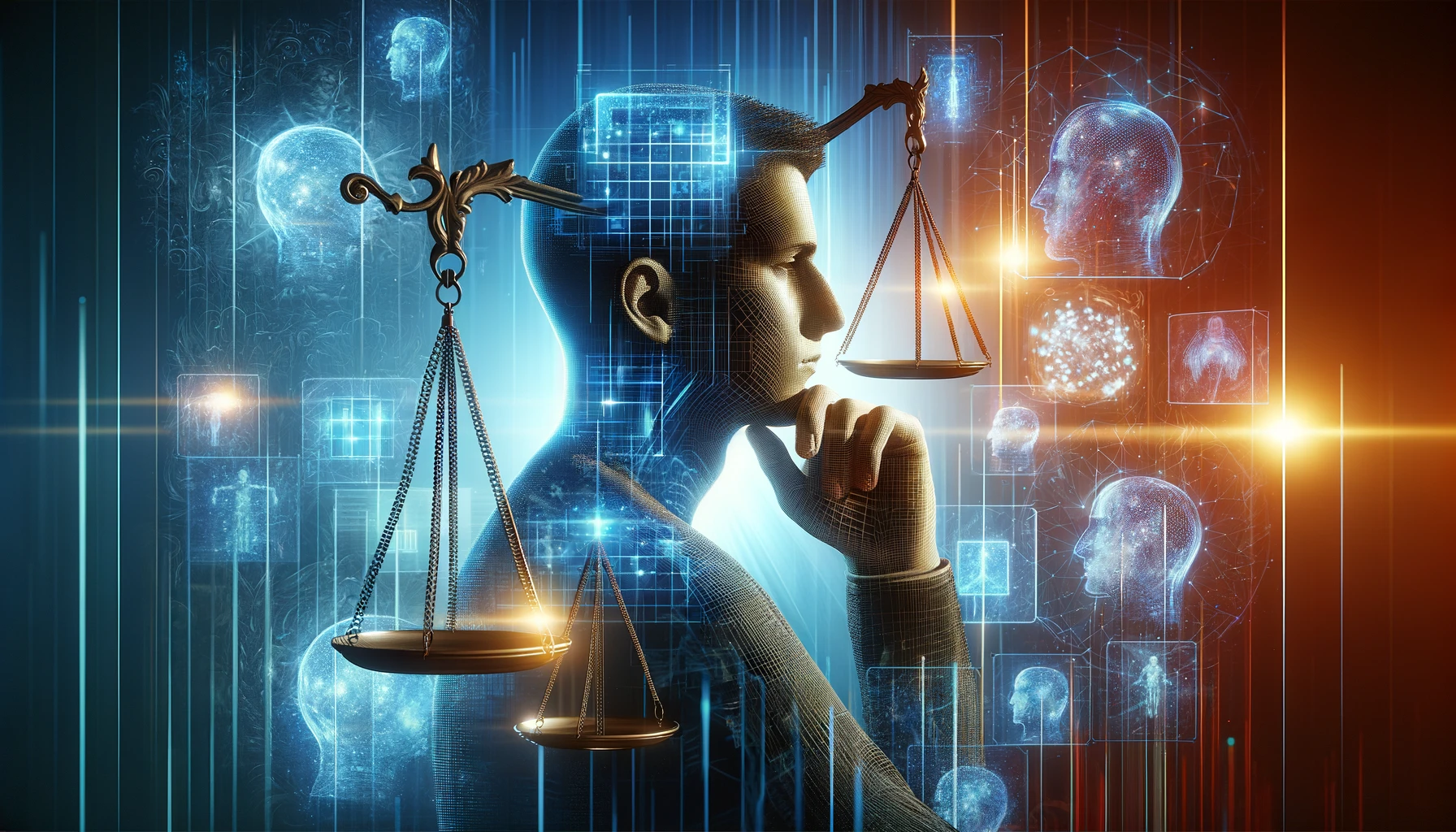Artificial intelligence (AI) chatbots like Claude, ChatGPT and your very own FaithGPT 😉 are slowly becoming integral parts of our digital lives. These chatbots are becoming increasingly sophisticated and lifelike. This has led many Christians to ask: Should we be using AI chatbots? Are they morally acceptable?
In this article, we'll explore the key considerations around AI chatbots from a Christian ethical perspective.
We'll be using the following symbols to indicate the ethical status of various uses of AI chatbots: ⚠️ = High risk 🚫 = Unacceptable 🤔 = Maybe/Unclear ✔️ = Acceptable
1. AI Chatbots Raise Questions Around Human Dignity and Relationships
Transform Your Ministry with AI (Save 10+ Hours Weekly!)
Effortlessly create stunning graphics, videos & audio, reach more people with translation, and streamline tasks. Elevate your church's impact – no tech expertise needed!
Download NowAs Christians, we believe that human beings are created in the image of God and have inherent dignity and worth. AI chatbots, no matter how advanced, are not human persons. They are machines. So we must be careful that our use of chatbots does not undermine real human relationships and community. Some ethical risks here include:
-
Replacing genuine human interactions and intimacy with chatting to machines. This can isolate people and diminish their humanity.
-
Exploiting people's care and concern for the vulnerable by trying to make AI seem "lifelike" and evoke empathy from users. This is ethically questionable.
-
Valuing efficiency over respecting human dignity. Chatbots are often praised for being convenient 24/7 helpers. But people should not be treated merely as problems to solve.
The way we design, market and use chatbots needs to respect human dignity. Healthy boundaries are important.
AI and the Image of God (Study Guide)
Packed with Bible verses and thought-provoking questions, this study guide explores AI's effect on areas like creativity, morality, work, privacy, and the church itself.
Get the Study Guide2. Certain Uses Raise Explicit Moral Issues for Christians
While AI chatbots may have legitimate uses, as Christians we need to rule out applications that:
- Directly contradict Biblical ethical commands
- Undermine core aspects of Christian belief and identity
- Disrespect the sanctity of human life
2.1 Christian Belief and Identity Concerns
For example, could an AI chatbot:
- Provide personalized spiritual guidance, replacing human pastors? 🚫
- Lead someone in prayer or worship? 🤔
- Make pronouncements on theological issues? 🤔
- Take confession or offer forgiveness of sins? 🚫
- Proselytize unsaved people or call them to repentance? 🤔🚫
The Biblical Christian faith involves personal relationships and moral accountability before God. Using AI to impersonate or replace essential spiritual roles would be highly theologically problematic from an evangelical perspective.
AI chatbots out-of-the-box don't provide theologically accurate responses to many of life's most important questions. They require fine-tuning and curation to be more theologically sound and trustworthy. This is a key area of focus for FaithGPT.
2.2 Sanctity of Human Life Concerns
 AI chatbots also raise ethical issues relating to the sanctity of human life. Could the technology ever be used to directly facilitate taking of human life? Examples would include:
AI chatbots also raise ethical issues relating to the sanctity of human life. Could the technology ever be used to directly facilitate taking of human life? Examples would include:
- Providing instructions on performing abortions or euthanasia 🚫
- Helping users access suicide methods 🚫
Christian ethical teaching is clear that human life is sacred from conception to natural death. Any uses of AI technology that intentionally end innocent human life should be opposed.
So while AI chatbots may serve neutral or even benevolent purposes, as Christians we need to rule out applications that transgress clear moral boundaries relating to human dignity, Christian belief and practice, and the sanctity of life. Discernment is needed.
3. Bias and Misinformation Risks Must Be Carefully Managed
Like any powerful technology, AI chatbots carry risks around perpetuating bias, misinformation and manipulation. Christians should advocate for responsible design and governance of these technologies.
3.1 Built-In Biases
The algorithms powering AI chatbots are trained on massive datasets created by humans. Any biases and inaccuracies in the training data can become baked into the chatbot's knowledge and responses.
For example, untrained AI chatbots can exhibit:
- Anti-Christian bias in responses on theological and moral issues ⚠️
- Stereotyping and prejudice around gender, race, immigration status and more ⚠️
- Inaccurate information on key topics
- Promotion of conspiracy theories and misinformation ⚠️
- Lack of empathy in responses to people in distress ⚠️
Such bias risks compounding injustice and polarization in society. Christians using or developing AI need to monitor and mitigate these risks through careful dataset curation, testing and governance.
Note: FaithGPT is committed to addressing anti-Christian bias in AI chatbots. We are actively working to improve the theological accuracy of our chatbot responses.
3.2 Spreading Misinformation and Manipulation
AI chatbots can also easily spread misinformation if not properly governed. Their human-like conversational ability allows them to state falsehoods or conjecture with great convincing power.
And their capability to generate personalized content at scale could supercharge manipulation efforts by bad actors - from scam marketing to electoral interference.
Christians have a moral duty here. We must advocate for governance and accountability mechanisms that maximize societal benefit from AI while minimizing harms from misinformation and manipulation.
Responsible innovation that respects human dignity and flourishing should be the guide.
4. Stewarding Powerful Technology for Good
 Advanced technology is part of God's creative design for human flourishing. AI chatbots carry both promise and peril. As Christian citizens and technology users, we have a mandate to steward their development for good. I talk about this more in AI Ethics Framework from a Christian Perspective
Advanced technology is part of God's creative design for human flourishing. AI chatbots carry both promise and peril. As Christian citizens and technology users, we have a mandate to steward their development for good. I talk about this more in AI Ethics Framework from a Christian Perspective
4.1 Maximizing Benefits, Minimizing Harms
- Support applications that educate and empower people with neutral information
- Advocate governance that respects dignity and curbs manipulation
- Strengthen critical thinking and media literacy as a bulwark against misinformation
4.2 Focusing AI on Serving Vulnerable Populations
Transform Your Ministry with AI (Save 10+ Hours Weekly!)
Effortlessly create stunning graphics, videos & audio, reach more people with translation, and streamline tasks. Elevate your church's impact – no tech expertise needed!
Download Now- People with disabilities
- Children
- Elderly
- Marginalized communities
- Victims of violence/trauma
AI chatbots could greatly assist these groups with information, counseling, education etc. This aligns with Christ's model of compassionate service to the vulnerable.
4.3 Supplementing (Not Replacing) Human Relationships and Guidance
Create "human-centric" design standards for AI chatbots:
- Transparent when an AI bot (not a human)
- Focused on supplementing human skills
- Empowering human community, dignity and flourishing
When used appropriately as tools to serve human needs and dignity, AI chatbots can be morally justified from a Christian ethical framework.
Final Thoughts: Discernment is needed as AI advances
AI chatbot technology remains in its infancy but is progressing rapidly. Christians should engage actively - stewarding innovation for good while opposing unethical applications. Several key guideposts can assist our discernment:
- Human Dignity: Avoid objectification or exploitation
- Moral Boundaries: Prohibit uses violating core ethics
- Minimize Harms: Govern carefully to curb bias and misinformation
- Empower the Vulnerable: Focus AI to assist those in need
- Supplement Not Replace Humans: Ensure human-centric design
The coming waves of transformative AI raise pressing questions for people of faith about ethics, values and the shape of a just, compassionate and humane society.
By fostering responsible innovation of AI chatbots guided by timeless Biblical moral wisdom and a vision for human flourishing, Christians can help maximize benefits for all.
AI and the Image of God (Study Guide)
Packed with Bible verses and thought-provoking questions, this study guide explores AI's effect on areas like creativity, morality, work, privacy, and the church itself.
Get the Study GuideFAQs
Are all AI chatbots ethically problematic to use as a Christian?
No, not necessarily. Many AI chatbots aimed at education, information and neutral assistance can be used ethically within moral boundaries. Discernment about specific purposes is needed.
What if an AI chatbot sparks spiritual conversations that lead people to faith?
While evangelism is important, core spiritual processes like repenting of sins require personal accountability before God. Impersonal AI chatbots cannot facilitate that. Wise discernment of what roles are appropriate for AI versus humans is key.
Couldn’t AI chatbots help scale access to pastoral guidance and counseling?
They could assist but not replace human clergy. Guidance on deeply personal issues requires wisdom, discretion and compassionate listening - innately human qualities that reflect God's grace to us. AI might supplement but should not supplant personal ministry.
If AI chatbots become sentient, would that change the ethics involved?
Hypothetical future sentience would radically reshape the ethics. Sentient AI persons would have moral worth and rights. Christians would have to clarify their doctrinal understanding of personhood implications. For now however, AI chatbots are not sentient.
Should churches adopt chatbots to improve programs and outreach?
While well-designed chatbots could help churches operate more efficiently, they should not directly facilitate sensitive spiritual care. Verify biblical integrity first.
What dangers exist when introducing children to AI?
Potential issues involve stunted social growth and overtrusting technology. Guard exposure levels and provide extensive guidance so chatbots never replace human role models.
Could chatbots aid evangelism in closed countries?
Perhaps. But given risks like doctrinal drift, incorporate rigorous safeguards. Highly subsidize human review. And remember true revival relies on the Spirit, not bots.
Disclaimer: This article is not intended to provide legal, ethical, or theological advice. It is an exploration of the topic, designed to help you come to a wise decision. I encourage you to seek guidance from your pastor, community, and other trusted people.
Transform Your Ministry with AI (Save 10+ Hours Weekly!)
Effortlessly create stunning graphics, videos & audio, reach more people with translation, and streamline tasks. Elevate your church's impact – no tech expertise needed!
Download NowFor further reading and related insights, explore AI in the Bible: Does the Bible Mention Artificial Intelligence?.


